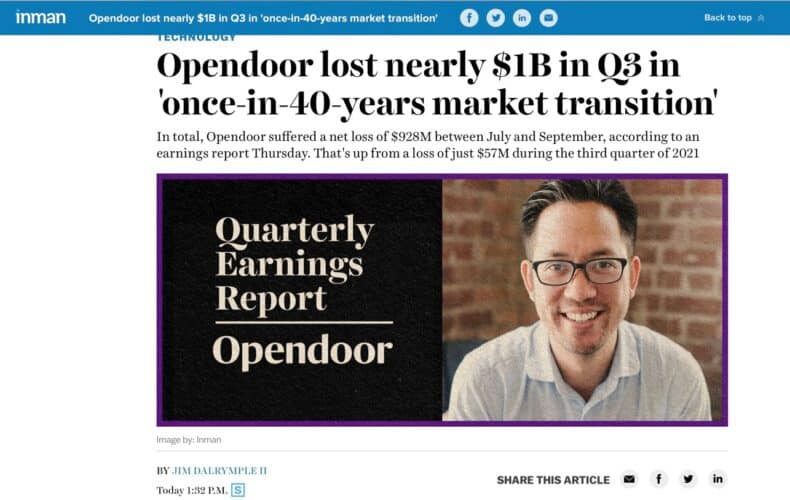Well, my least favorite buyer has died. I don’t usually write about fatalities here, because it’s morbid and in spite of my fatalistic worldview, I prefer to keep this site a bit lighter than those darker corners of life might desire. This buyer wasn’t very old, which made the death that much more tragic. When I die, you’ll know because I’ll probably write about it while I’m dying. Like I’ll write “things are bad and getting worse” and then you’ll wonder if I’m talking about the market or about my health. Even so, when this particular buyer died, I didn’t shed a tear. I knew it was going to happen. This buyer was sick. Flawed. I knew they didn’t have a long life, even while they were skipping and laughing and earning. Sadly, today, the world knows what I knew was coming: The iBuyer has died.
In 2018, I wrote this:
Opendoor has a current valuation over $2B, yet they only operate in 19 cities more than five yearsafter their launch. Why aren’t they in more cities? Why aren’t they everywhere? Well, because the model relies on algorithms to determine the current value of your home, as well as the value of your home in the coming weeks and months. Opendoor will buy your home, without a pesky agent, and without that pesky market exposure, and then, once you’ve moved out and closed your deal with them, they’ll resell your house for a profit. That’s it. They’re the modern day tech company that has replaced the yellow signs on the side of the interstate that promise “I BUY HOUSES CASH”.
The model works as long as the market is appreciating. It also works as long as the market has a very tight pattern of sales. Would Opendoor work in Lake Geneva? Not in a million years. Will it work in Winnetka? Nope. Will it work when the market falters? No. The reason is simple. When a market stalls, consumers generally fail to recognize the slowdown for a reasonably long period of time. They are defiant. They are insistent. They are stubborn. If OpenDoor needs to buy your home for a 5% discount to actual value today (in an escalating market), what will they offer you in a declining market? 90% of the value? 80% of the value? Will consumers be willing to sign on for this initial, deep cut, without finding out if the market is indeed as poor as OpenDoor is telling them? No, they won’t.
David Curry
News today of Opendoor’s recent earnings ($OPEN), and the news is not good. They lost a lot of money. They are cutting lots of jobs. They are in some serious trouble (note I am not a financial adviser and this is not financial or stock advice, just some commentary on the business of real estate). And that trouble makes good sense, since interest rates are up and buyer demand is down and it turns out you cannot endlessly spin terrible ranches with tiny pools surrounded by scorched earth and scorpions. Zillow figured out this iBuyer business was a terrible model and they abandoned their intentions earlier this year. Opendoor is stubborn, and with a market cap of $629M (down from their 2018 value of $2.8B), it seems as though the world of real estate isn’t as ripe for disruption as Softbank once thought.
I guess I tell you some of this because you should know that your chosen agent actually understands the business of real estate. Anyone can mail you little trinkets and calendars and ask for your referrals, but it might make sense to hire someone who sees the market, sees the business, and understands how they both work. RIP, iBuyer, I will always remember how much I disliked you from our very first introduction.

